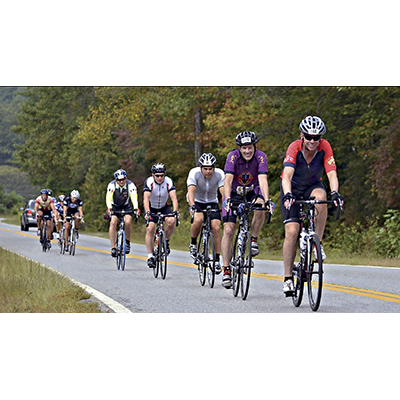Traveling one hundred miles does not seem too challenging with our modern means of transportation powered by electricity, gasoline engines, or even jet fuel. But a few years ago I chose to ride my bicycle one hundred miles, powered by me.
After completing eighty miles, pedaling for approximately five hours, I was starting to realize just how challenging this ride was. My muscles were starting to feel more and more fatigued, the wind was starting to blow harder, and despite the snacks I had eaten at the rest stations, I was hungry. At that point I was tempted to get off that bicycle forever. Then several other cyclists who were riding the same route passed me by and seemed to not be bothered by the circumstances; they even laughed and chatted as they rode. My riding partner also showed no signs of quitting. The actions of these participants encouraged me to continue the last twenty miles.
When the odometer on the bicycle registered ninety-nine miles, I was feeling pretty good, thinking there was only one more mile to go. But when I reached the one-hundred-mile point, my attitude took another plunge. The finish line was not in sight—in fact, no other riders were in sight. Something was wrong. Had my partner and I made a wrong turn? Were we lost? I didn’t think I could go on; my legs were hardly able to push the pedals anymore. As we continued, another rider came up from behind us and said that the finish line was three miles ahead. Wearily I plugged along…and yes, I made it.
The next year I decided to participate in the same cycling event. But I handled the preparation time differently. I knew that in order to accomplish my goal, I needed to increase my mental and physical endurance.
Endurance is the ability required to continue firm or resolute through opposition or challenges. To build my endurance, I first made sure my goal was Biblically sound. In this case, I knew that to be stronger physically and mentally would help me be able to serve God’s people for a long time. Next, I reestablished in my mind that this endeavor was important to me. With this at the core of my concentration, I could then focus on the goal and overcome obstacles should they arise. And last, I recalled examples of other people who had accomplished physical and mental feats, demonstrating their great capacity to endure.
At the start of the second cycling event, I knew I had increased my capacity to endure. I was much more prepared and confident this time. When I reached the one-hundred-and-three-mile mark, I sprinted across the finish line.
What it takes to develop strength and endurance for accomplishing spiritual goals is no different than the steps I used on my bicycle ride. We want to set our Biblical goals and solidify their importance. In His Word, God gives us many examples of those who accomplished godly feats, demonstrating a great capacity to endure. We’ll first consider Paul’s example of overcoming obstacles. Next, we’ll be inspired by the endurance of Joseph, who stood faithfully for God during his lifetime.
If we are to endure and continue toward our goals, we must firmly establish in our minds that these goals are worth the required effort. The greatest way to start this process is to know that our goals are within God’s will and that these goals are truly important to us.
First let’s learn about making goals that are Biblically sound. Our greatest example, Jesus Christ, was a master at setting goals according to God’s Word. He made God’s will his will.
John 5:19:
Then answered Jesus and said unto them, Verily, verily, I say unto you, The Son can do nothing of himself, but what he seeth the Father do: for what things soever he doeth, these also doeth the Son likewise.
John 4:34:
Jesus saith unto them, My meat is to do the will of him that sent me, and to finish his work.
However, the work was not always easy, even for Jesus Christ; it took endurance.
Hebrews 12:2:
Looking unto Jesus the author and finisher of our faith; who for the joy that was set before him endured the cross, despising the shame, and is set down at the right hand of the throne of God.
As he served God and did His will, the joy he looked forward to gave him the capacity to bravely hold out and finish his work on the cross, thinking little or nothing of the sense of disgrace with his public crucifixion. His focused determination and his ability to endure led him to be seated at the right hand of the throne of God. No more shame and agony, it was the ultimate victory! The benefits always exceed the effort when we put God first in our lives. Likewise, if we take the approach of setting our goals according to the Word of God, then we will stay on course and we can declare with conviction the words of Jesus Christ:
John 5:30:
I can of mine own self do nothing: as I hear, I judge: and my judgment is just; because I seek not mine own will, but the will of the Father which hath sent me.
This mind-set, this type of conviction, is a great way to approach life. But such a declaration can wither away if it is not backed with actions. In carrying out the actions, we must have the conviction to stay the course. And our God does not leave us without encouragement—He desires for us to succeed. He promises us a more abundant life and true freedom as we act.…
This is an excerpt from the January/February 2014 issue of The Way Magazine.
Copyright© 2014 by The Way International. All rights reserved.
For more information on subscribing to The Way Magazine, Click Here

